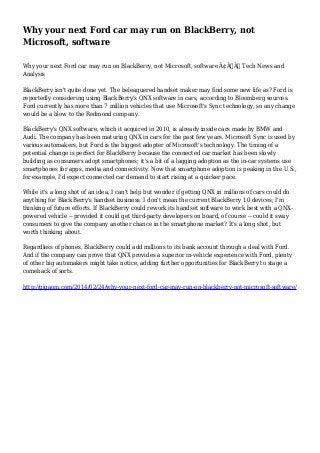
Why your next Ford car may run on BlackBerry, not Microsoft, software
- 1. Why your next Ford car may run on BlackBerry, not Microsoft, software Why your next Ford car may run on BlackBerry, not Microsoft, software — Tech News and Analysis BlackBerry isn't quite done yet. The beleaguered handset maker may find some new life as? Ford is reportedly considering using BlackBerry's QNX software in cars, according to Bloomberg sources. Ford currently has more than 7 million vehicles that use Microsoft's Sync technology, so any change would be a blow to the Redmond company. BlackBerry's QNX software, which it acquired in 2010, is already inside cars made by BMW and Audi. The company has been maturing QNX in cars for the past few years. Microsoft Sync is used by various automakers, but Ford is the biggest adopter of Microsoft's technology. The timing of a potential change is perfect for BlackBerry because the connected car market has been slowly building as consumers adopt smartphones; it's a bit of a lagging adoption as the in-car systems use smartphones for apps, media and connectivity. Now that smartphone adoption is peaking in the U.S., for example, I'd expect connected car demand to start rising at a quicker pace. While it's a long shot of an idea, I can't help but wonder if getting QNX in millions of cars could do anything for BlackBerry's handset business. I don't mean the current BlackBerry 10 devices; I'm thinking of future efforts. If BlackBerry could rework its handset software to work best with a QNXpowered vehicle -- provided it could get third-party developers on board, of course -- could it sway consumers to give the company another chance in the smartphone market? It's a long shot, but worth thinking about. Regardless of phones, BlackBerry could add millions to its bank account through a deal with Ford. And if the company can prove that QNX provides a superior in-vehicle experience with Ford, plenty of other big automakers might take notice, adding further opportunities for BlackBerry to stage a comeback of sorts. http://gigaom.com/2014/02/24/why-your-next-ford-car-may-run-on-blackberry-not-microsoft-software/